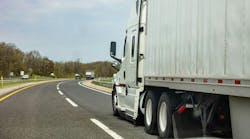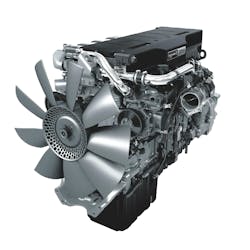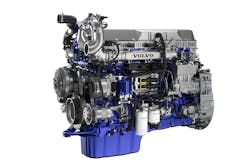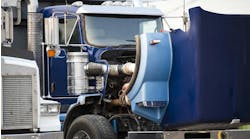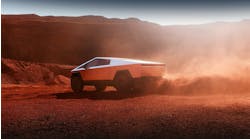The clock is ticking on modern heavy-duty trucking. But today’s fleet leaders must balance that push to embrace decarbonization with the pragmatic pull to focus on and find the best equipment supported by today’s best trucking power infrastructure: diesel fuel.
That more regulated, fossil-free-fuel future is getting closer with initial federal clean truck emissions regulations beginning with 2027 models. Those regulations should be phased in over time, which means most fleets will still rely on diesel powertrains well into the next decade.
Being clean and green isn’t new to trucking. Today’s fleet leaders and drivers operate in a much different world than previous generations. Contemporary clean diesel-powered Class 8 equipment produces 99% less emissions than heavy-duty trucks built in the 1980s, according to the American Trucking Associations.
Diesel’s not done
“We still expect diesel to be a major factor in transportation for many years—and we are investing in the next generation of Detroit engines,” Len Copeland, product marketing manager for Daimler Truck North America’s Detroit brand, told FleetOwner.
Diesel will continue to be trucking’s primary fuel for long-haul operations in the coming years. However, Copeland noted that electric commercial trucks are better suited for pickup-and-delivery and regional haul operations on set routes.
See also: Diesel’s dominance continues as trucking plans clean energy shift
“The eCascadia and eM2 are in production and ready to be put into service provided infrastructure is in place to operate them,” Copeland said of Freightliner’s heavy-duty and medium-duty electric truck offerings. “EVs are still a small portion of the market, and while adoption is expected to grow over the next few years, the trucking industry is very large and diverse in both applications and routes of operation.”
And with many of those post-2027 clean trucking regulations still yet to be finalized, DTNA’s strategy is evolving.
“As far as the timeline to transition away from diesel, our ambition is to transition to exclusively CO2-neutral new vehicles by 2039,” Copeland explained. “It’s important to remember, these are new technologies—and it will take time for fleets to begin to test them out in smaller numbers.”
He noted that fleets might want to try out a few trucks operating on alternative fuels, such as battery-electric. “Their site may only be able to support those one or two units,” he said. “And adding more after they evaluate their needs is likely to take several years of progress to continue working on getting scaled up.”
Developing more ICE options
Major truck OEMs are still working on making internal combustion engines more efficient. “As we’ve said, we see a long future for the internal combustion engine—particularly running on renewable, fossil-free fuels, which will make an even greater reduction in CO2 emissions,” Johan Agebrand, product marketing director at Volvo Trucks North America, told FleetOwner.
He said VTNA is focusing on its “three-pillar” decarbonization powertrain strategy. “We understand that there is no silver bullet answer to address all applications to decarbonizing transportation.”
The first major OEM to market with an over-the-road Class 8 BEV, Volvo VNR Electric trucks already have more than 3.65 million customer miles in the U.S. and Canada. However, the OEM is still focused on making its diesels more efficient.
See also: ZE regs threaten supply chains
VTNA is launching its all-new Volvo VNL flagship Class 8 truck this year. The new model is up to 10% more efficient than the 2018 VNL, Agebrand said. “The platform that the all-new Volvo VNL is built on will be the platform for all our future technologies, including BEV and fuel cell, and the future of the ICE running on drop-in fossil-free renewable fuels, including hydrogen. In terms of investment, we must continue to invest heavily in all three strategies.”
Paccar, which produces Kenworth and Peterbilt trucks, also focuses on multiple powertrain technologies. Sarah Abernethy, Kenworth powertrain marketing manager, told FleetOwner the OEM wants to ensure its fleet customers have options “as we head into the future.”
‘A long way to go’
Paccar’s California Air Resources Board-compliant MX-13 engine will be released later this year. “And we’re developing the next generation of cleaner diesel engines alongside our zero-emission lineup of battery-electric and fuel-cell powertrain options,” Abernethy noted.
Along with its powertrain systems, including Class 8 hydrogen fuel cell technology developed with Toyota, Kenworth offers Cummins’ compressed and liquid natural gas lineup of powered products, including X15N and L9N systems. “Both are CARB compliant to ensure our California customers have options,” she said.
See also: Latest oils and lubricants for heavy-duty fleets
While California boasts the strictest fleet emissions rules in the nation, Abernethy noted that Kenworth still focuses on all its North American customers. “While we know that zero-emission powertrains are critical to our success, we also know we have a long way to go—which is what is driving our continued development of more efficient diesel powertrains as well,” she said.
As regulations become firmer, she expects customer demand for cleaner technologies to grow. “Kenworth is focused on offering products and services to help our customers adopt ZEV vehicles, including a dedicated Kenworth grant-writing resource who is familiar with current and upcoming grants that can help fleets manage and navigate the application process,” Abernethy explained.
